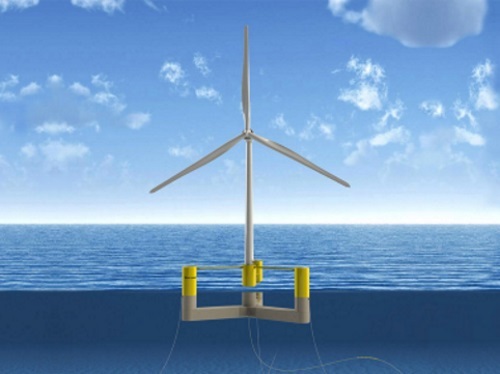The Maine Department of Transportation has formed an Offshore Wind Port Advisory Group (OSWPAG) to advise it and other state officials regarding the potential development of wind port facilities, which will be integral to promoting the University of Maine’s patented floating offshore wind technology and attracting offshore wind industry investment to Maine.
[Above image via the University of Maine]
The OSWPAG consists of 19 members representing a spectrum of local, regional, and statewide stakeholders, including representatives from the environmental, business, port and marine transportation, fishing, labor, construction, and conservation interests.
State government officials representing Maine DOT, the Governor’s Energy Office or GEO, the Governor’s Office of Policy Innovation & Future, the Maine Department of Marine Resources, and others will serve as subject matter experts to support the OSWPAG’s work. New England Aqua Ventus – the firm working with GEO to develop the floating offshore wind research array – and Maine Coast Heritage Trust, the holder of the conservation easement on the 600 acres of Sears Island reserved for conservation, will also be available to serve as technical advisors. Maine DOT said it would provide logistical and communications support for those efforts.
“Maine DOT and our collaborating state agencies want to thank the members of the Offshore Wind Port Advisory Group for agreeing to be part of this important process,” said Bruce Van Note, the agency’s commissioner, in a statement.
“We expect the stakeholders on this group to have varying perspectives and to engage in robust and thoughtful discussions regarding the potential for port development to support the rapidly growing offshore wind market,” he added. “This group’s work will provide important input as we look ahead to the ways Maine can help harness clean energy while creating jobs and strengthening our state’s economy.”
The formation of the OSWPAG is a companion effort to the Maine Offshore Wind Initiative led by the GEO, which is exploring the responsible development of floating offshore wind energy in the federal waters off the Gulf of Maine while ensuring balance with our state’s maritime industries and environment.
Maine DOT said a key component of this broader GEO initiative is the development of the Offshore Wind Roadmap, a comprehensive economic development planning process now underway. Working groups of the Roadmap include those studying energy markets, environmental and wildlife issues, supply chain, workforce development, port, and marine transportation needs, and fisheries.

